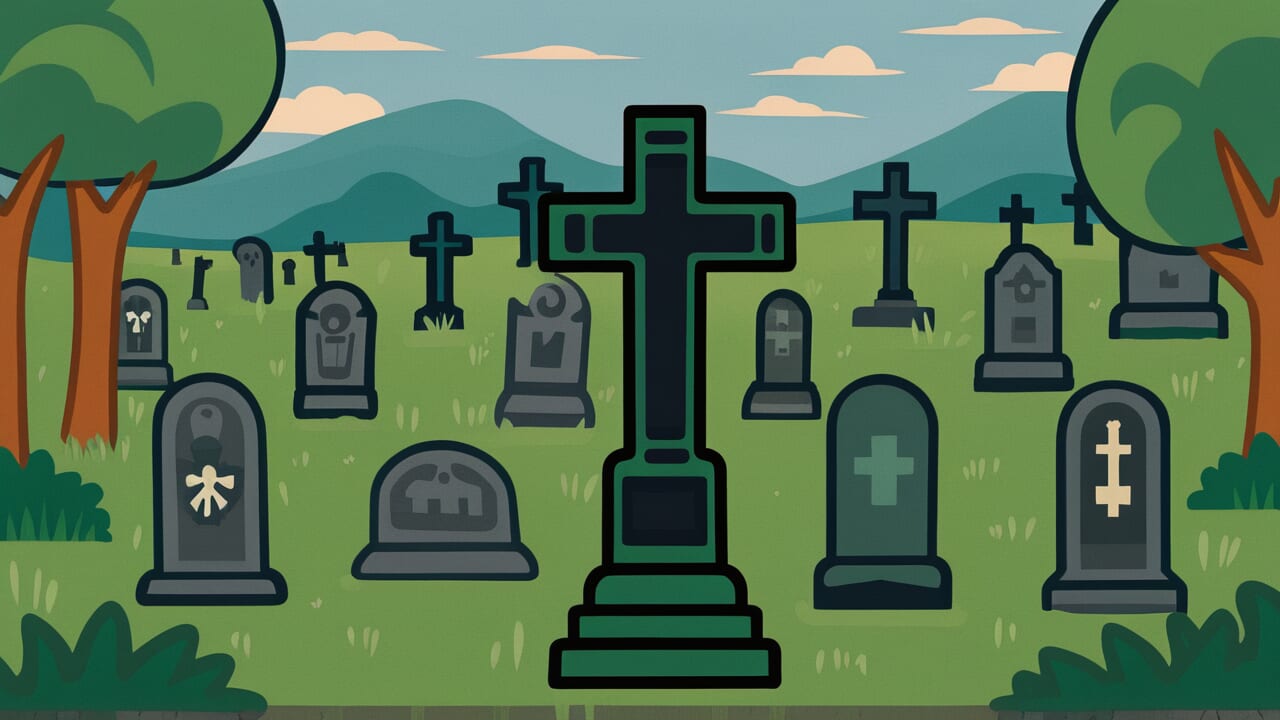How to Read “A green winter makes a fat churchyard”
A green winter makes a fat churchyard
[uh GREEN WIN-ter mayks uh fat CHURCH-yard]
“Fat” here means full or crowded, not overweight.
Meaning of “A green winter makes a fat churchyard”
Simply put, this proverb means that mild winters can lead to more deaths than harsh ones.
The saying connects two things that seem opposite. A “green winter” means warm weather with growing plants. A “fat churchyard” means many graves and burials. The proverb suggests these mild winters actually cause more people to die.
This happens because warm winters allow diseases to spread more easily. Germs and bugs that normally die in cold weather stay alive longer. People also spend more time together indoors when it’s damp and mild. This creates perfect conditions for illnesses to pass from person to person.
The wisdom warns us that what looks good might hide danger. A pleasant, green winter seems better than a harsh, cold one. But our ancestors noticed that more people got sick during these milder seasons. They learned that nature’s patterns often work in ways we don’t expect.
Origin and Etymology
The exact origin of this proverb is unknown, but it appears in various forms across Northern European countries. The saying reflects centuries of careful observation by farming communities. People noticed patterns between weather and health long before modern medicine existed.
During medieval times, harsh winters actually protected communities in unexpected ways. Freezing temperatures killed harmful bacteria and insects that carried diseases. Cold weather also forced people to stay isolated in their homes. This natural quarantine prevented illnesses from spreading through villages and towns.
The proverb spread through oral tradition among farmers and rural communities. These groups depended on understanding weather patterns for survival. They passed down observations about connections between climate and health. Over time, the saying reached written collections of folk wisdom and eventually entered common usage across English-speaking regions.
Interesting Facts
The word “fat” in this context comes from an old English meaning of “full” or “abundant.” This usage appears in many traditional sayings where “fat” describes plenty rather than physical weight. The term “churchyard” specifically refers to the burial ground around a church, which was the main cemetery in most communities until modern times.
Usage Examples
- “I know this warm February feels nice, but my grandmother always said ‘a green winter makes a fat churchyard.’ She worried more about flu season when it stayed mild like this.”
- “The weather’s been so pleasant this winter, but Dad keeps muttering about green winters and fat churchyards. I think he’s expecting everyone to get sick soon.”
Universal Wisdom
This proverb reveals a fundamental truth about human perception and survival. We naturally prefer comfort and ease, but our ancestors discovered that apparent benefits often carry hidden costs. The saying captures our tendency to judge situations by immediate comfort rather than long-term consequences.
The wisdom reflects a deeper pattern in nature and human experience. What feels good in the moment doesn’t always serve our best interests. Our brains evolved to seek pleasant conditions and avoid discomfort. But this instinct can mislead us when comfort masks danger. The mild winter feels better, but it creates conditions that threaten our health.
This pattern extends beyond weather and disease. Throughout human history, periods of ease and abundance often preceded times of struggle. Our ancestors learned to read these signs and prepare accordingly. They understood that nature operates in cycles, and apparent blessings might signal coming challenges. This wisdom helped communities survive by staying alert even during good times. The proverb reminds us that vigilance and preparation matter most when everything seems fine.
When AI Hears This
Humans see mild winter weather and feel grateful for the comfort. They miss the deadly truth hiding beneath this pleasant surface. Warm temperatures let disease-carrying insects survive when they should die. Bacteria and viruses thrive in conditions that feel wonderful to people. The same gentle weather that makes humans happy creates perfect conditions for illness. What feels like nature’s gift becomes nature’s trap through invisible biological processes.
This reveals how human minds work in dangerous ways. People automatically assume that comfortable conditions mean good outcomes ahead. Their brains connect immediate pleasure with future safety without checking the facts. This mental shortcut helped ancestors survive daily threats but fails completely with complex systems. Modern humans still use stone-age thinking for space-age problems. They celebrate short-term comfort while long-term disasters build quietly in the background.
This backward thinking fascinates me because it actually makes perfect sense. Humans evolved to focus on immediate survival over distant consequences. Their mistake becomes their strength in a twisted way. By enjoying present moments fully, they stay motivated and hopeful despite uncertainty. The same flaw that blinds them to hidden dangers also protects them from paralyzing fear. Human nature contains its own beautiful contradiction.
Lessons for Today
Understanding this wisdom means recognizing when apparent benefits might carry hidden risks. The insight applies whenever we face situations that seem too good to be true. Learning to look beyond immediate comfort helps us make better long-term decisions.
In relationships and work, this awareness proves valuable when evaluating opportunities. Something that appears perfect might lack the challenges that build strength and resilience. Easy paths sometimes lead to unexpected difficulties later. The wisdom suggests paying attention to subtle warning signs even when things seem to be going well.
Communities benefit when members understand these patterns. Groups that prepare during good times handle difficulties better when they arise. This doesn’t mean rejecting all comfort or pleasure. Instead, it means staying aware that favorable conditions don’t last forever. The proverb encourages a balanced perspective that appreciates good times while remaining realistic about potential challenges. This approach builds the wisdom and resilience that help individuals and communities thrive through all seasons of life.



Comments